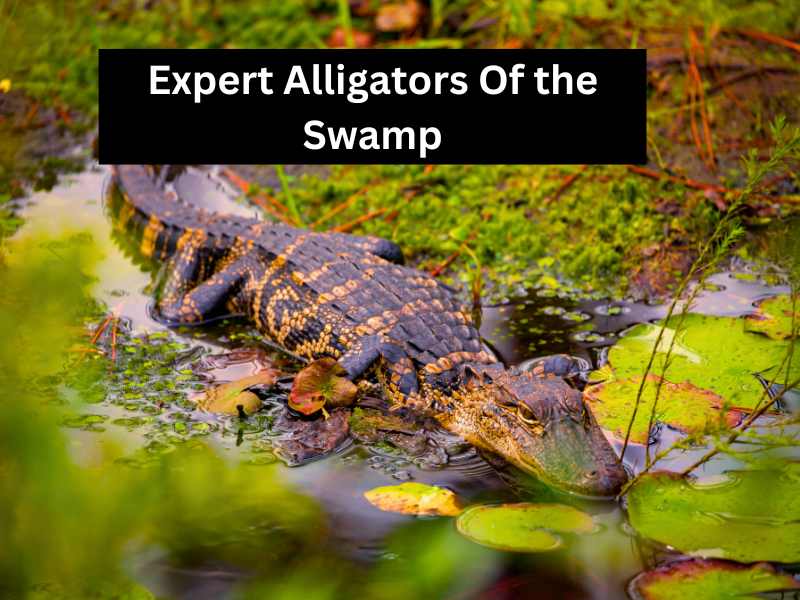Wow Amazing A-Z About Alligators, Episode 2

Ancient leviathans of the swamp, alligators are colossal reptiles that have reigned over freshwater ecosystems for millions of years. These living fossils, boasting bone-crushing jaws and nearly impenetrable armor, strike a fearsome presence in the murky waters of swamps, marshes, and rivers. Primarily found in the southeastern United States and pockets of China, alligators are apex predators, playing a critical role in maintaining the health of their wetland homes.
Expert Alligators Of the Swamp
alligators meticulously craft dens known as gator holes within the banks of their watery domains. These elaborate burrows serve as vital sanctuaries, offering refuge from not only predators but also the scorching summer sun and the biting cold of winter. Within the cool, damp confines of the gator hole, alligators can rest, regulate their body temperature, and even raise their young.

Here are some additional fascinating facts about alligators:
- Evolutionary throwbacks: Alligators have been around for over 37 million years, predating even the mighty dinosaurs!
- Swimming powerhouses: Despite their bulky appearance, alligators are surprisingly agile swimmers, thanks to their powerful tails that propel them through the water with surprising speed.
- Devoted mothers: Unlike most reptiles, female alligators exhibit remarkable parental care. They fiercely guard their nests and even help their hatchlings adjust to life in the swamp.
- Ecological keystone species: Alligators play a vital role in maintaining the health of wetland ecosystems. By controlling prey populations and scavenging on carrion, they help keep the waterways clean and balanced.
alligator’s specific habitat preferences
Freshwater Haven: Alligators are exclusively found in freshwater environments, making their homes in the sprawling wetlands of the southeastern United States and southeastern China. These vital ecosystems, teeming with life, provide the perfect haven for these apex predators.
Swamp Sanctuary: Swamps, with their sluggish, shallow waters and dense vegetation, are a favorite haunt for alligators. The murky depths offer excellent camouflage, allowing them to lie in wait for unsuspecting prey. The abundant vegetation provides not only food sources but also crucial nesting sites. Alligators create intricate tunnel networks within the swampy banks, offering vital escape routes from predators and a place to thermoregulate during extreme temperatures.

Marsh Majesty: Marshes, with their characteristic mix of freshwater and saltwater, can also be prime alligator habitat. Similar to swamps, marshes offer shallow waters with ample prey and hiding places. However, due to their lack of salt glands, alligators cannot tolerate saltwater for extended periods and typically stick to the freshwater zones within the marsh.
River Resident: Slower-moving rivers are another preferred habitat for alligators. These freshwater arteries provide ample hunting grounds and convenient travel corridors that allow alligators to navigate their vast territories. Basking areas along the riverbanks are crucial for regulating body temperature, with alligators often seen sprawled out in the warm sun.
By inhabiting these diverse freshwater ecosystems, alligators play a vital role in maintaining the ecological balance of these wetlands. They function as apex predators, keeping prey populations in check, and also act as scavengers, helping to keep the waterways clean.
Alligator Age: Ancient Survivors
Alligators are true living fossils, boasting a lineage that stretches back a staggering 37 million years. This predates even the reign of the dinosaurs! This remarkable longevity extends to individual alligators as well.
Here’s a breakdown of their impressive lifespan:
- Wild Alligators: In the wild, alligators typically live for 30 to 50 years. This can be attributed to the dangers they face, such as predation (especially during their juvenile stages) and competition for resources.
- Captive Alligators: Alligators in controlled environments like zoos and sanctuaries can live much longer, with lifespans reaching up to 70 years or even exceeding that. This is due to factors like a consistent food source, reduced exposure to predators, and veterinary care.
The oldest known alligator, Muja, resides in the Belgrade Zoo and is estimated to be over 83 years old! This remarkable reptile serves as a testament to the incredible longevity these prehistoric creatures can achieve.

Alligator Age: Ancient Survivors
Gator holes, which are often seen in wetland landscapes, play a crucial role in the survival of alligators. These remarkable creatures, known as ancient survivors, have adapted and thrived for millions of years. Alligators possess a remarkable ability to create and maintain gator holes, which are essential for their survival. These depressions, dug out by the alligators themselves, serve as valuable refuges during droughts and provide a suitable environment for their young to grow and develop. The presence of gator holes not only contributes to the overall ecosystem health but also highlights the fascinating resilience of these ancient reptiles.
The sentiment of the alligator passage is overall positive. Here’s why:
- The text highlights the alligator’s impressive features like powerful jaws, armor, and longevity.
- It describes their habitat as a haven and emphasizes their role as apex predators maintaining a healthy ecosystem.
- Interesting facts like their parental care and role as scavengers contribute to a positive image.
- Even the section on age, while mentioning dangers in the wild, focuses on their remarkable lifespan.
There’s no negativity towards alligators themselves. The text might imply some dangers they pose to prey, but it doesn’t portray them in a negative light.









[…] lush rainforests to arid deserts. Belonging to the family Formicidae and the order Hymenoptera, ants are social insects, meaning they live in large colonies with complex social structures. With over […]
[…] tamanduas […]